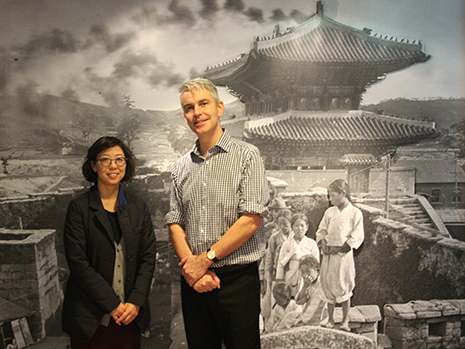'Opportunities for deepening and broadening the relationship between Australia and Korea through intellectual engagement are virtually limitless.'
These are the words of Dr Matthew Richards, Visiting Lecturer, Centre for Australian Studies (CAS), at the prestigious Yonsei University, Seoul.
CAS–the only centre of its kind in Korea–was founded in October 2008 to more closely connect Australia and Korea through research, education and networking. It is located in the Graduate School of International Studies at Yonsei.
CAS has to date organised three international conferences, including one focusing on multicultural Australia and lessons for Korea, and it has published three books, including two on contemporary Australia.
Dr Richards says his visiting fellowship to CAS last year proved how the relationship between the two countries is being greatly enhanced through international studies.
CAS offered two courses on Australian studies, one for undergraduate and the other for postgraduate, the latter being offered for the first time in a Korean university thanks to the vision and hard work of its Director, Professor Lee Heejin. The students improved their knowledge of Australia and enhanced their understanding of Australia's relationship to Korea and the world.
'In addition to developing their "Australian literacy", students are exercising the critical-thinking skills that Australian studies requires,' says Dr Richards, whose visit was funded by the Australia–Korea Foundation, Department of Foreign Affairs and Trade.
Fourteen postgraduate and 24 undergraduate students are enrolled at CAS, with the calibre 'impressive', says Dr Richards: 'Australia and Korea have much to gain from the exchanges of such bright, young, hard-working and globally competent people.'
The studies are valuable in directly challenging some 'unhelpful preconceptions' about Australia, says Dr Richards, including that Australia is 'little America', that Australia does not have a rich culture or history and that Australian universities are not top of their class.
Through the CAS international studies' programs, students gain a rich and new-found appreciation of Australia, with many expressing genuine interest in coming here, to visit, work, study, and, perhaps, even to live. Korea is the source of the third largest group of foreign study enrolments in Australia, with much more room to grow.
While in Korea, Dr Richards participated in a wide range of CAS activities, including seminars, research collaboration, and guest lectures. His hard work did not stop when he returned home from his 2014 trip and settled back into his work at the School of History, Heritage and Society Faculty of Arts, Education and Social Sciences, Deakin University.
Three pieces of joint research are in train between Dr Richards and Professor Lee Heejin, including for the Break of Gauge project, examining the historical search for a standard in Australian rail gauges. Another piece of research focuses on the conception of Australia as a transnational entity during the colonial era.
Korea has the potential to become a major research partner for Australia, with the number of jointly published science and technology publications still relatively low in comparison to the high-calibre research performance of each country. Research, such as that conducted by Dr Richards and Professor Lee Heejin, will help reverse this.
An added bonus of Dr Richard's CAS fellowship is the many strong connections he built outside the university–relationships at senior levels, which will endure. This network, like many others already and to be established through CAS, will deepen public understanding of contemporary Australia and strengthen people-to-people connections. It's part of Australia's overall interest in actively engaging with countries of interest.
CAS published books:
- Understanding Contemporary Australia I & II (2011, 2013, KSi)
- Australia and Korea: The History of 120 Years (2009, Yonsei University Publishing).
CAS international conferences on Australia and Korea:
- Multicultural Australia and Lessons for Korea (2009)
- Beyond Armistice: Korea-Australia Cooperation for Peace and Security (2010 with Nautilus Institute, RMIT University).
Links:
The Centre for Australian Studies: http://iews.or.kr/ctr/e/australia/
Yonsei University: http://gsis.yonsei.ac.kr


